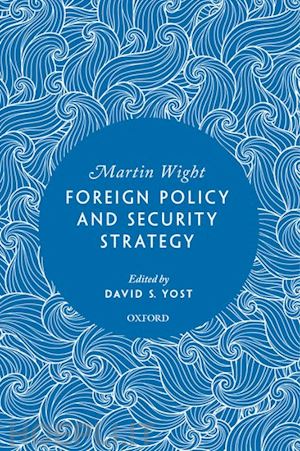1 - Introduction: Martin Wight on Foreign Policy and Security Strategy
2 - The Balance of Power in Diplomatic Investigations
3 - The Balance of Power and International Order in The Bases of International Order
4 - Does Peace Take Care of Itself?
5 - The Idea of Neutrality
6 - Nationalism and World Order
7 - Has Scientific Advance Changed the Nature of International Politics in Kind, Not Merely in Degree?
8 - The Political Consequences of Nuclear Weapons
9 - War and Peace: The Hobbesian Predicament
10 - War and Peace: Nuclear Weapons and Change in International Politics
11 - Arms Races
12 - Interests of States
13 - Interests, Honour and Prestige
14 - Is the Commonwealth a Non-Hobbesian Institution?
15 - Suggestions for a Projected Study of International Security Organisation
16 - From the League to the UN
17 - The United Nations Assembly
18 - The United Nations General Assembly
19 - The Security Council
20 - Two Blocs in One World
21 - The Power Struggle within the United Nations
22 - Review of Henrique de Pinheiro, The World State or the New Order of Common Sense
23 - Review of John Middleton Murry, Trust or Perish
24 - Review of David Mitrany, A Working Peace System: An Argument for the Functional Development of International Organization (London: National Peace Council, 1946)
25 - Review of Ely Culbertson, Must We Fight Russia? (Philadelphia: The John C. Winston Company, 1946)
26 - Review of C. E. M. Joad, Conditions of Survival (London: Federal Union, 1946)
27 - Review of J. L. Brierly, The Covenant and the Charter (Cambridge: Cambridge University Press, 1947)
28 - Review of W. W. Rostow, The American Diplomatic Revolution (Oxford: Clarendon Press. 1947)
29 - Review of William C. Bullitt, The Great Globe Itself: A Preface to World Affairs (New York: Scribner, 1946, and London: Macmillan, 1947)
30 - Review of Frances Perkins, U.S. Secretary of Labor from 1933-1945, The Roosevelt I Knew, (New York: Viking Press, 1947; London: Hammond, Hammond & Co., 1947)
31 - Review of Barbara Ward, Policy for the West (London: Penguin, 1951)
32 - Review of John MacLaurin, The United Nations and Power Politics (London: Allen and Unwin, 1952)
33 - Review of Hugh Seton-Watson, The Pattern of Communist Revolution (London: Methuen, 1953). (American Edition: From Lenin to Malenkov: The History of World Communism, New York: Praeger, 1953)
34 - Review of A. P. Thornton, The Imperial Idea and Its Enemies: A Study in British Power (London: Macmillan, 1959)
35 - Review of John H. Herz, International Politics in the Atomic Age (New York: Columbia University Press, 1959).
36 - Review of Rupert Emerson, From Empire to Nation: The Rise to Self-Assertion of Asian and African Peoples (Cambridge, Massachusetts, Harvard University Press; and London, Oxford University Press, 1960)
37 - Review of Hugh Seton-Watson,Neither War nor Peace: The Struggle for Power in the Post-War World (London, Methuen, 1960)











